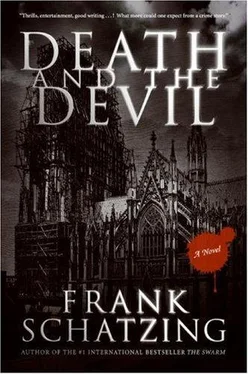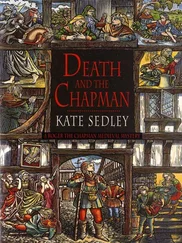He paused, then went on. “Now it is in the nature of things that the powerful are constantly at each others’ throats. The pope wanted to turn the empire into an ecclesiastical state under the authority of the Church. The emperor, for his part, also claimed to be God’s representative—naturally, since God is the authority—and denied the pope any jurisdiction in political and territorial matters. Each tried to clip the other’s powers and increase his own. Thus the Crusades, for example, were not holy wars, but a conflict between the secular and spiritual authorities. They agreed on a common enemy, and had a common army, but one or the other of them always came out on top, depending on circumstances. The dilemma only became public, however, when the emperor and the pope began to attack each other openly. The archbishops, being servants of two masters, couldn’t really fight against themselves. They were in danger of being crushed between two stones. You’re still with me?”
“Conrad von Hochstaden,” Richmodis interjected, “doesn’t look particularly crushed to me.”
“Clever girl. That’s the way things were going. The archbishops had to become more powerful. And they did so to the point where they could side with one of their masters and leave the other in dire straits. Loyalty didn’t have much to do with it. Basically, the archbishops don’t care one bit about the emperor or pope. They’re interested in politics, not in saving souls. But their strategy worked. Over the centuries they became powerful enough to grant their support as a favor. But that led to a further dilemma. Whom does the city serve?”
“The archbishop?”
“On the one hand. He is its overlord. On the other, it also serves the emperor. It’s part of the empire and the citizens are his subjects.”
Jacob risked a deduction. “So if the archbishop and the pope combined against the emperor, then the city would have to oppose the emperor, willy-nilly.”
“Exactly! Willy-nilly. To decide for themselves, the citizens would have to make themselves independent of the archbishop. The archbishop needs them and their money. If he is to go to war, in whoever’s name, he needs well-filled coffers. So what did the archbishops do? Tried to get the cities on their side. Buttered them up. Granted privileges and promised the moon. In general they succeeded in getting absolute control over the cities. Except in Cologne.”
“Why not here?”
“Why?” Jaspar raised his eyebrows. “Just look around. A rich city. Wine and textiles, goldsmiths, metalworkers, armorers. Trading to the farthest boundaries of the known world and a magnet for pilgrims. Nowhere in Christendom is there such a perfect combination of religious fervor and cold calculation. A religious center and the strongest economic power in the empire. No wonder the citizens began to question the archbishops’ rule. They supported them now and again, but only when the archbishops’ aims coincided with their own interests.”
“I still don’t understand. The archbishop rules over people who don’t obey his rule. Does he rule or not?”
“Well.” Jaspar leaned back and clasped his hands behind his head. “People here have problems recognizing either the pope or the emperor when they’ve not been involved in the election. In 1198 there was a contest for the crown that Otto IV won. Why? The decisive factor was the Cologne leadership that supported England as Otto’s proposer. And why did they do that? To promote Cologne’s interests in the English trade. There you have it in a nutshell. The citizens of Cologne are interested in profit, and their main concern is to get rid of the archbishops, who bleed them dry and dictate to them. But what should an archbishop do if not bleed his subjects dry and dictate to them? If he doesn’t rule, he’s superfluous. That’s the root of the eternal conflict, even though there were times when the archbishop was quite popular with the citizens.”
“When they were more Christian?” Richmodis mocked.
“Huh! The people of Cologne have always been pious, not Christian. But an archbishop like Reinhard von Dassel, who brought the bones of the Three Kings to Cologne a hundred years ago, strengthened both his own position and that of the city. Lots of pilgrims, lots of new inns, lots of money coming in. And his successor, Philip von Heinsberg, used this as a base to acquire castles, estates, and privileges. He soon became one of the most powerful princes in the empire, and everything he did increased the importance of Cologne. And once they had got that far on their archbishops’ coattails, the good citizens began to think of ways of getting rid of them. So they built the walls—partly out of fear of Philip’s enemies, since he was always waging war, but also because they knew there was bound to be armed conflict between the archbishop and the city eventually.”
“But if Philip was so powerful,” Richmodis commented, “why couldn’t he impose his will on them?”
“Because his power was based on money, money he had borrowed from the Cologne merchants. As everyone knew. The emperor would never have given his blessing to a subjugation of the city by force. He wanted the foremost economic power in his empire to flourish. Philip would have risked being taken to court.”
“He could have gotten the pope to support him.”
“Not a hope. He had even more debts in Rome. There was nothing he could do and Cologne was quietly preparing for self-government. Then it happened. The emperor decided in favor of the city—which shows just what economic strength can do. They did have to pay a kind of fine, but they were allowed to continue building the walls. From then on the archbishops lost more and more influence, leaving the city folk facing a different problem. Namely which of them was to be boss.”
Jacob thought. “You said money is power.”
“Precisely. In the main, the independence movement had been driven by the patricians. But then they controlled most of the city’s trade. You’ll know that the two burgomasters came from their ranks. What you perhaps didn’t know is that until recently one of them also had to be a magistrate. At some point it became established that every magistrate had to come from the great merchant houses, who were trying to occupy all official positions in the city. The magistrates, originally impartial judges, became the mouthpiece of the patricians, who started to raise taxes to pay for the administration, for example, the burgomasters.”
“Isn’t that quite reasonable?” objected Jacob.
“Perhaps. But the burgomasters naturally wanted to put on as imposing a show as possible. Latterly they took to giving glittering parties, which they claimed were essential for the work of the authorities. The authorities being the patricians, of course. This all made a big hole in the finances, so they increased the taxes. It had less and less to do with representing the interests of the inhabitants of Cologne, and the noble families, as they like to call themselves, did less and less to conceal their contempt for tradesmen and excluded them from all official positions. Though that didn’t stop them from dipping into everyone’s pockets and even getting themselves elected masters of the guilds.”
“But why did the craftsmen put up with it?”
“Ask the opposite question. Why would patricians want to be elected guildmasters?”
“To represent the interests of the trades?”
“And weaken them politically. They promised them protection against the archbishop’s jurisdiction, but then they controlled all appointments to the judiciary. Another step toward depriving the archbishop completely of power. Favors given and received, an incredible sink of corruption.” Jaspar sighed. “At least, that was the situation when Conrad von Hochstaden was made archbishop.”
Читать дальше












